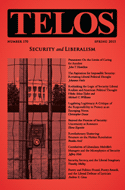 Western societies increasingly imagine, plan, and even rehearse their own destruction. This cultural habit reflects a growing contradiction in democracy. On the one hand, liberal societies laud the ideals of participatory democracy, free speech, individual liberty, and governmental transparency. On the other, they grow ever more committed to the biopolitical regulation of life, the mitigation of threats to public health and safety, and the restriction of liberties as a way of securing liberty itself. How do we understand the inexorable growth of a security paradigm in liberal democracies? The answer lies partly in the cultural imaginary that shapes public contemplation of citizenship, liberty, and security. This imaginary reflects both the growing influence of biopolitics and the legacy the Cold War covert action. Paradoxically, the Cold War state’s growing commitment to covert action was itself increasingly public; as a result, public culture has became obsessed with, and enamored of, covert affairs. Despite state secrecy, most citizens believe they know the “kinds of things” their government is doing in secret—yet they cannot know in detail, and they receive most of their knowledge in the form of melodramatic fiction. The result is a growing irrationality in the democratic public sphere.
Western societies increasingly imagine, plan, and even rehearse their own destruction. This cultural habit reflects a growing contradiction in democracy. On the one hand, liberal societies laud the ideals of participatory democracy, free speech, individual liberty, and governmental transparency. On the other, they grow ever more committed to the biopolitical regulation of life, the mitigation of threats to public health and safety, and the restriction of liberties as a way of securing liberty itself. How do we understand the inexorable growth of a security paradigm in liberal democracies? The answer lies partly in the cultural imaginary that shapes public contemplation of citizenship, liberty, and security. This imaginary reflects both the growing influence of biopolitics and the legacy the Cold War covert action. Paradoxically, the Cold War state’s growing commitment to covert action was itself increasingly public; as a result, public culture has became obsessed with, and enamored of, covert affairs. Despite state secrecy, most citizens believe they know the “kinds of things” their government is doing in secret—yet they cannot know in detail, and they receive most of their knowledge in the form of melodramatic fiction. The result is a growing irrationality in the democratic public sphere.
|
|
||||
|
Telos Press Publishing · PO Box 811 · Candor, NY 13743 · Phone: 212-228-6479 Privacy Policy · Data Protection Copyright © 2024 Telos Press Publishing · All Rights Reserved |
||||







